七年级英语下册 Unit 12 What did you do last weekend(第3课时)Section B(1a-2a)
七年级英语下册unit12_What_did_you_do_last_weekend_Section_A_2
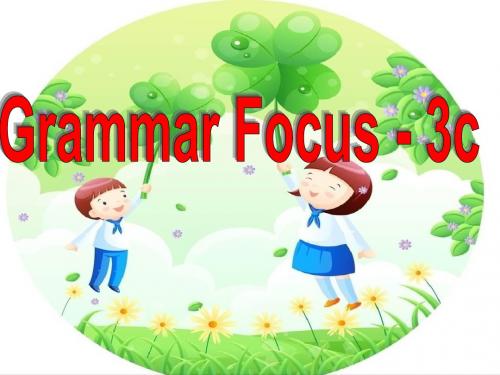
7. 她去了农场。
____________________________ She went to the farm.
8. 她和谁一起去的?
____________________________ Who did she go with?
9. 她和她的同学们一起去的。 She went with her classmates. ____________________________
1. A: ______ What did you do last weekend? B: I played badminton on Saturday. A: Sounds fun! _____ Who did you play with? B: I played with my father. He’s really good!
阅读Grammar Focus部分,完成
下列句子。 1. 上个周末你做什么了? What did you do last weekend? ___________________________ 2. 我做了我的家庭作业。 I did my homework. __________________
_____ Why _____ were you late yesterday?
2. 特殊疑问词 + did + 动词原形 + 主语 +其 他? 昨天他做了什么事情? _____ What ____ did he do yesterday? 上个周末她参观了什么地方? ______ Where ____ did she _____ visit last weekend? 你和谁一起去的动物园? ____ Who ____ did you go to the zoo _____? with 他们什么时候到达北京的? _____ When ____ did they arrive in Beijing?
012版新目标英语七年级下册unit12_What_did_you_do_last_weekend
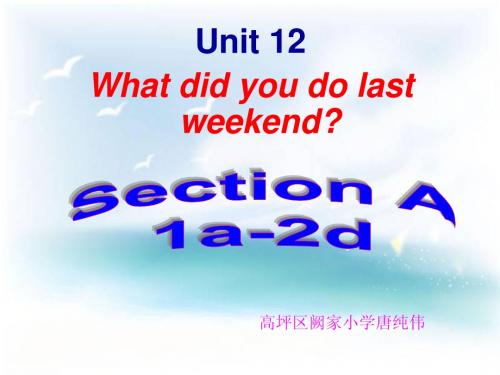
He studied for his English test.
Where did Jack go last weekend?
He went to the farm.
What did he do there?
He fed some cows there.
sheep
butterfly
visitor
1. sheep 名词,意为“绵羊”。它是单复 数同形的单词,当它作主语时谓语动词 的单复数形式要根据它在句中的意思来 确定。类似的单词还有deer (鹿), Chinese (中国人)等。例如: Where are your sheep, Ted? Every sheep has a thick woolly coat. 每只羊身上都穿着一件厚的羊毛外套。
2. I worked as a guide at the Natural History Museum. 我在自然历史博物馆里做导游的工作。 “work as + 职业” 意为“做某工作”。 例如: 埃里克在那家俱乐部里做音乐老师的工 作。 Eric works as a music teacher in the club.
What did he do?
He went to the cinema.
What did they do?
They went to the beach.
What did they do?
They went fishing.
What did he do last weekend?
He did his homework.
Student A asks questions with who, 2c what or where and Student B answers. Then change roles.
七年级英语下册Unit12Whatdidyoudolastweekend重点单词及句型背诵默写
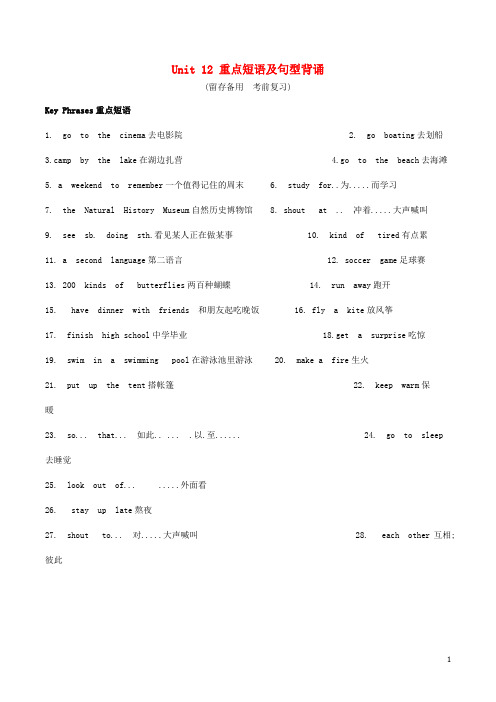
Unit 12 重点短语及句型背诵(留存备用考前复习)Key Phrases重点短语1. go to the cinema去电影院2. go boating去划船3.camp by the lake在湖边扎营4.go to the beach去海滩5. a weekend to remember一个值得记住的周末6. study for..为.....而学习7. the Natural History Museum自然历史博物馆 8. shout at .. 冲着.....大声喊叫9. see sb. doing sth.看见某人正在做某事 10. kind of tired有点累11. a second language第二语言12. soccer game足球赛13. 200 kinds of butterflies两百种蝴蝶 14. run away跑开15. have dinner with friends 和朋友起吃晚饭 16. fly a kite放风筝17. finish high school中学毕业 18.get a surprise吃惊19. swim in a swimming pool在游泳池里游泳 20. make a fire生火21. put up the tent搭帐篷 22. keep warm保暖23. so... that... 如此.. ... .以.至...... 24. go to sleep去睡觉25. look out of... .....外面看26. stay up late熬夜27. shout to... 对.....大声喊叫 28. each other互相;彼此29. play badminton打羽毛球 30. wake... up把... ... 弄醒31. up and down上上下下;起伏 32. go camping野营Key Sentences 重点句型1. What did you do last weekend? 你上周末做了什么?2. How was your weekend? 你周末过得怎样?3.I worked as a guide at the Natural History Museum. 我在自然历史博物馆当过导游。
Unit12Whatdidyoudolastweekend知识点人教版七年级英语下册

Unit12 What did you do last weekend?句子词汇精讲【重点短语】1. last weekend 上周末2. go to the cinema 看电影3. go boating 去划船4. camp by the lake 在湖边露营5. go to the beach 去海滩6. study for the English test 为了英语考试学习7. feed some cows 喂一些奶牛8. work as a guide 做导游工作9. over 200 kinds ofbutterflies 超过200多种蝴蝶10. living habits 生活习惯11. be kind of tired 有点儿累12. stay up 熬夜13.as a special gift 作为一个特殊的礼物14. put up the tents 搭建帐篷15. make a fire 生火16. keep sb. warm 使某人保持温暖17.so...that... 如此…以至于…18. get a surprise 吃惊19. see sb. doing sth. 看见某人正在做某事20. jump up and down 上蹦下跳21. climb onto one’s back 爬到某人背上22. shout at/shout to 大声喊叫23. wake …up 把...弄醒24. a useful lesson 有用的一课1.by the lakeby介词, 意为“在……旁边”,表示位置,相当于beside。
拓展:by作介词的其他常见用法:(1)表示移动方向,意为“经过”。
例如:My mother goes by the building every day. 我妈妈每天从这栋楼旁边经过。
(2)表示方式及手段,意为“用,靠,通过”。
He makes a living by fishing. 他以捕鱼为生。
七年级英语下册unit12_What_did_you_do_last_weekend
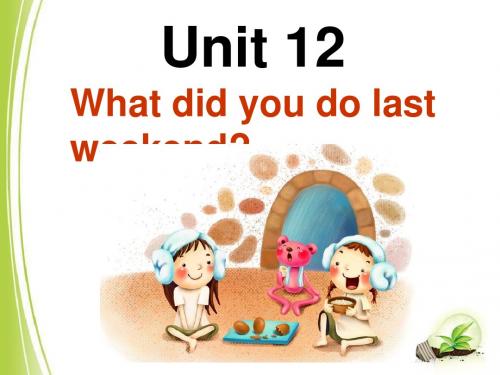
1. I worked as a guide at the Natural History Museum. 我在自然历史博物馆里做导游的工作。 “work as + 职业” 意为“做某工作”。 例如: Eric works as a music teacher in the club. 埃里克在那家俱乐部里做音乐老师的工作。 2.How interesting! 多么有趣啊! 这是一个感叹句,句子结构为: How + 形容词或副词 + (主语 + 谓语)! 例如:How interesting the book is! 那本书太有趣了! 3. stay up 意为“熬夜;深夜不眠” 。 例如: Don’t stay up late. It’s bad for your health. 不要熬夜,这对你的健康不好。
Who ____ did you go to the zoo _____? with 3.____ 你和谁一起去的动物园?
When ____ did they arrive in Beijing?他们什么时候到达北京的? 4._____
对下列句子中的划线部分提问。
1. I got up at nine yesterday morning. ______ ___ you get up yesterday morning? When did 2. We did our homework last night. _____ What ____ did you ___ do last night? 3. They were in the supermarket last Sunday. Where _____ were they last Sunday? _______ 4.My last weekend was kind of boring. How _____ was your last weekend? _____ 5.Linda took a walk with her parents after dinner. _____ Who ____ did Linda take a walk with after dinner?
人教版新目标七年级下学期Unit-12--what-did-you-do-last-weekend--知识点

Unit 12 what did you do last weekend?Section A 知识讲解一. last(1)last形容词“最后的,最末的”或者“紧接前面的,刚过去的”。
Today is the last day in the year.最后一天。
I didn’t sleep well last night. 昨晚(2)last副词,“最后地”,I’m the last one.最后一个。
(3)last 动词,“持续,继续,维持”等,The hot weather lasted a week.持续了一周。
二. camp(1)camp 动词,“扎营,搭帐篷”。
We go camping every summer.We walked all day and camped by a river at night.(2)camp 名词,“露营地,度假营”。
Let’s go back to the camp, it’s getting dark. 让我们回营地吧,天黑下来了。
根据汉语提示填空。
(1)When did you join the ______ ______ (夏令营)?(2)I like ______ ______ (去宿营)in the open air.3)We______(宿营)in the forest last night. (4)Let’s go back to the ______(营地)三. sheepsheep 可数名词,“绵羊”,复数还是sheep;goat指山羊。
How many sheep are there on your farm? 你们农场里有多少只羊?拓展:常见的单复数同形的名词还有:deer (鹿),fish (鱼),Chinese (中国人),Japanese(日本人)等。
四. byby介词, “在……旁边”,相当于beside。
Our teacher is sitting by the window.by与交通工具名词连用时,名词前不用冠词,意为“乘、坐、用”等。
人教版英语七下U12 What did you do last weekend 讲义(学生版)

Unit12 What did you do last weekend?一、重点词汇及拓展1. campv. __________________ 去野营n. __________________ 去野营2. asprep. ______e.g. ________________________ 我在这儿作导游。
prep. ______e.g. ________________________ 他和我跑得一样快。
____________ 和...一样____________ 众所周知3. natural adj. ______e.g. ____________________________________自然博物馆里有许多蝴蝶。
______ n. 自然____________ 在大自然中____________ 享受大自然4. tired adj.__________________劳累;疲倦5. stayv.__________________待在家v.__________________保持健康____________熬夜____________远离...6. run away ______put away ______take away ______throw away ______give away ______go away ______7. mouse n.______复数:______8. shout v.____________呼喊...______朝...喊叫(带有情绪)9. language n.____________身体语言____________语言的美____________第二语言10. flyv.______e.g. ____________________________________他们在湖边放风筝。
____________飞去某地n.______e.g. __________________ 我讨厌苍蝇。
七年级英语下册Unit12Whatdidyoudolastweekend知识点
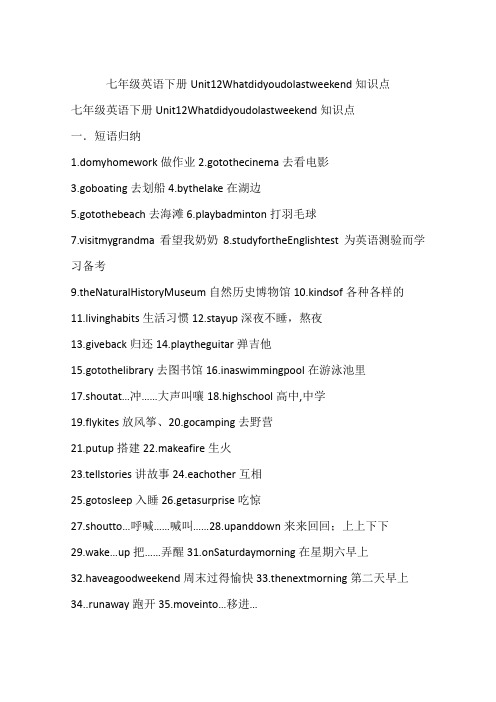
七年级英语下册Unit12Whatdidyoudolastweekend知识点七年级英语下册Unit12Whatdidyoudolastweekend知识点一.短语归纳1.domyhomework做作业2.gotothecinema去看电影3.goboating去划船4.bythelake在湖边5.gotothebeach去海滩6.playbadminton打羽毛球7.visitmygrandma看望我奶奶8.studyfortheEnglishtest为英语测验而学习备考9.theNaturalHistoryMuseum自然历史博物馆10.kindsof各种各样的11.livinghabits生活习惯12.stayup深夜不睡,熬夜13.giveback归还14.playtheguitar弹吉他15.gotothelibrary去图书馆16.inaswimmingpool在游泳池里17.shoutat…冲……大声叫嚷18.highschool高中,中学19.flykites放风筝、20.gocamping去野营21.putup搭建22.makeafire生火23.tellstories讲故事24.eachother互相25.gotosleep入睡26.getasurprise吃惊27.shoutto…呼喊……喊叫……28.upanddown来来回回;上上下下29.wake…up把……弄醒31.onSaturdaymorning在星期六早上32.haveagoodweekend周末过得愉快33.thenextmorning第二天早上34..runaway跑开35.moveinto…移进…二.用法集萃1.go+doing去做某事2.play+球类玩……球3.时间段+ago……前 4.keep+sb./sth.+形容词/副词/介词短语使……保持……5.so+形容词/副词+that句子如此……以至于……6.seesb.doingsth.看见某人正在做某事7.letsb.dosth.让某人做某事8.starttodo/doingsth.开始做某事三.重点句型1.—Whatdidyoudolastweekend?—Ididmyhomework.—上个周末你做了什么了?—我做我的家庭作业了。
unit_12_What_did_you_do_last_weekend?词句精讲精练
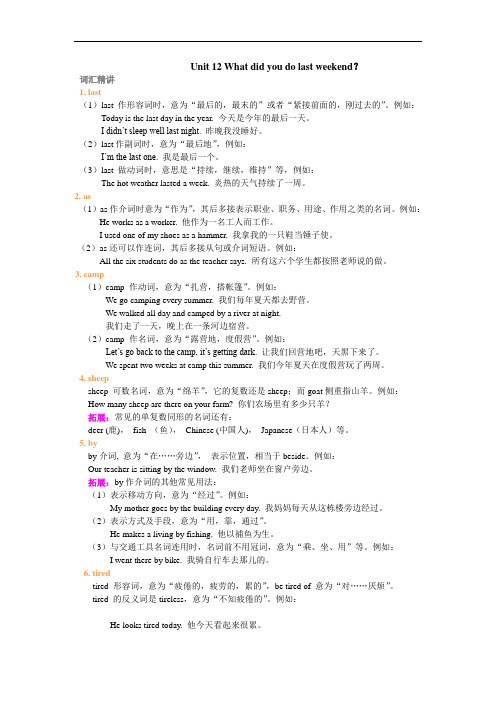
Unit 12 What did you do last weekend?词汇精讲1. last(1)last 作形容词时,意为“最后的,最末的”或者“紧接前面的,刚过去的”。
例如:Today is the last day in the year. 今天是今年的最后一天。
I didn’t sleep well last night. 昨晚我没睡好。
(2)last作副词时,意为“最后地”,例如:I’m the last one. 我是最后一个。
(3)last 做动词时,意思是“持续,继续,维持”等,例如:The hot weather lasted a week. 炎热的天气持续了一周。
2. as(1)as作介词时意为“作为”,其后多接表示职业、职务、用途、作用之类的名词。
例如:He works as a worker. 他作为一名工人而工作。
I used one of my shoes as a hammer. 我拿我的一只鞋当锤子使。
(2)as还可以作连词,其后多接从句或介词短语。
例如:All the six students do as the teacher says. 所有这六个学生都按照老师说的做。
3. camp(1)camp 作动词,意为“扎营,搭帐篷”。
例如:We go camping every summer. 我们每年夏天都去野营。
We walked all day and camped by a river at night.我们走了一天,晚上在一条河边宿营。
(2)camp 作名词,意为“露营地,度假营”。
例如:Let’s go back to the camp, it’s getting dark. 让我们回营地吧,天黑下来了。
We spent two weeks at camp this summer. 我们今年夏天在度假营玩了两周。
4. sheepsheep 可数名词,意为“绵羊”,它的复数还是sheep;而goat侧重指山羊。
人教版七年级下册英语Unit12What-did-you-do-last-weekend?知识点总结

七下Unit 12 What did you do last weekend?一、Important Phrases:1.go to the cinema 去影院★=go to the movies2.go boating/camping 去划船/野营★summer camp 夏令营3.camp by the lake 在湖边野营★by the pool在池边4.go to the beach 去海滩★on the beach 在沙滩上5.play badminton 打羽毛球play+球类/棋类名词(不加冠词)6. study for the test 备考★test=exam7.feed some sheep/cows喂羊/牛★feed(fed)on...以..为食,feed with...用...喂养8. work as a guide 做导游工作★work as +职业从事某工作9. at the Natural History Museum 自然历史博物馆★nature(n.不可数)大自然-natural(adj.)自然的10. over 200 kinds of butterflies 200多种蝴蝶★over=more than 超过11.living habits 生活习惯★make a living 谋生;eating habits饮食习惯12.kind of tired 有点累★kind of = a little13. stay up late 熬夜★stay at home 待在家,stay away from 远离,lately(adv.)最近地14.sleep early 早睡★sleepy 困的,asleep睡着的15.a family of mice 老鼠一家★mouse(单)-mice(复)16.be afraid of sth./to do 害怕★afraid=scared17.run away 跑开★take away 带走,put...away 把某物收拾好,give away 捐赠18. climb onto one’s back 爬上某人的背19. shout at/to sb.冲某人大叫★shout out 大喊出20. a second language 第二语言★mother tongue 母语21.fly a kite放风筝22.do something interesting 做有趣的事★修饰不定代词,adj.后置:anything special23.finish high school 中学毕业★finish doing sth 完成做某事24.a special gift一特殊礼物★gift=present25.take us to India 带我们去印度26.take a long bus ride 坐很久的公交车27.put up our tents 搭帐篷★put up:搭建,举起,张贴28.make a fire生火29.cook food on the fire 在火上做饭★on an open fire 明火,篝火30.tell cach other stories 互相讲故事★tell a lie 说谎,tell a joke 讲笑话31.keep sb.warm 使某人保持暖和32.sit under the moon 坐在月光下★moonlight月光,moon cake月饼33.so.......that.......如此...以致于...34.get a surprise 吃惊35. look out of...向外看★look out 小心,look for寻找,look after 照顾36. jump up and down 跳上跳下37. move into the forest 进入森林38. wake sb up叫醒某人★wake up醒来,awake醒着的39. read a book about history 读一本历史书★read...to sb给某人读...40.see an interesting talk show 看有趣的脱口秀二、Key Language Points:1.Where did you go last weekend? What did you do last weekend?上周末你去了哪里?上周末你做了什么?一般过去时的特殊疑问句:1)特殊疑问词+did+主语+v.(原)+其他?如疑问词作主语,则陈述语序,如:Who bought you this new dress?谁给你买的新裙子?2)特殊疑问词+was/were+主语+其他?Where were you last night?昨晚你在哪里?2.----Who visited her grandma? -----Becky did.为避免重复,常用do,does,did,so等代替前文提到的内容。
季七年级英语下册 Unit 12 What did you do last weekend课文重难点讲解(无答案)(新版)新人教版
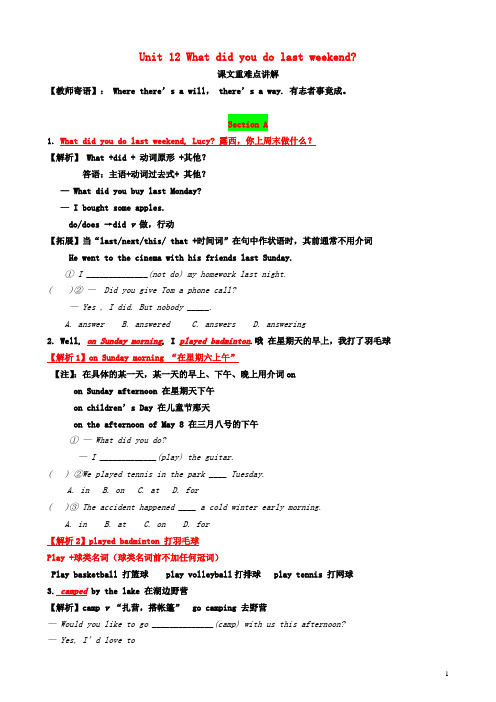
Unit 12 What did you do last weekend?课文重难点讲解【教师寄语】:Where there’s a will,there’s a way. 有志者事竟成。
Section A1. What did you do last weekend, Lucy? 露西,你上周末做什么?【解析】 What +did + 动词原形 +其他?答语:主语+动词过去式+ 其他?— What did you buy last Monday?— I bought some apples.do/does →did v 做,行动【拓展】当“last/next/this/ that +时间词”在句中作状语时,其前通常不用介词He went to the cinema with his friends last Sunday.① I ______________(not do) my homework last night.( )②—Did you give Tom a phone call?— Yes , I did. But nobody _____.A. answerB. answeredC. answersD. answering2. Well, on Sunday morning, I played badminton.哦在星期天的早上,我打了羽毛球【解析1】on Sunday morning “在星期六上午”【注】:在具体的某一天,某一天的早上、下午、晚上用介词onon Sunday afternoon 在星期天下午on children’s Day 在儿童节那天on the afternoon of May 8 在三月八号的下午①— What did you do?— I _____________(play) the guitar.( ) ②We played tennis in the park ____ Tuesday.A. inB. onC. atD. for( )③ The accident happened ____ a cold winter early morning.A. inB. atC. onD. for【解析2】played badminton 打羽毛球Play +球类名词(球类名词前不加任何冠词)Play basketball 打篮球 play volleyball打排球 play tennis 打网球3. camped by the lake 在湖边野营【解析】camp v“扎营,搭帐篷” go camping 去野营— Would you like to go ______________(camp) with us this afternoon?— Yes, I’d love to4. I studied for the math test. 我为数学测验而学习。
七年级下Unit 12 What did you do last week单词短语语法听写.doc
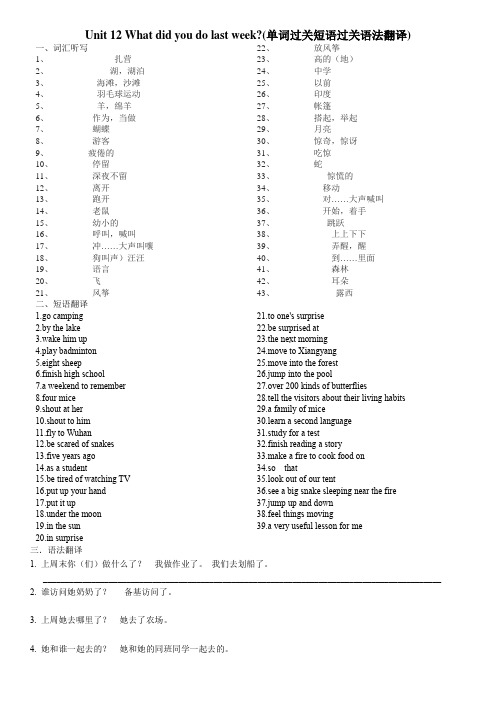
Unit 12 What did you do last week?(单词过关短语过关语法翻译)一、词汇听写1、______________扎营2、_____________湖,湖泊3、_________海滩,沙滩4、_________羽毛球运动5、_________羊,绵羊6、_________作为,当做7、_________蝴蝶8、_________游客9、_________疲倦的10、_________停留11、_________深夜不留12、_________离开13、_________跑开14、_________老鼠15、_________幼小的16、_________呼叫,喊叫17、_________冲……大声叫嚷18、_________狗叫声)汪汪19、_________语言20、_________飞21、_________风筝22、_________放风筝23、_________高的(地)24、_________中学25、_________以前26、_________印度27、_________帐篷28、_________搭起,举起29、_________月亮30、_________惊奇,惊讶31、_________吃惊32、_________蛇33、___________惊慌的34、___________移动35、___________对……大声喊叫36、___________开始,着手37、____________跳跃38、_____________上上下下39、_____________弄醒,醒40、_____________到……里面41、_____________森林42、_____________耳朵43、_____________露西二、短语翻译1.go camping _________2.by the lake _________3.wake him up_________4.play badminton________5.eight sheep_________6.finish high school_________7.a weekend to remember________8.four mice _________9.shout at her _________10.shout to him _________11.fly to Wuhan _________12.be scared of snakes _________13.five years ago _________14.as a student _________15.be tired of watching TV_________16.put up your hand_________17.put it up _________18.under the moon _________19.in the sun_______20.in surprise _______ 21.to one's surprise_______22.be surprised at_______23.the next morning_______24.move to Xiangyang_______25.move into the forest _______26.jump into the pool_______27.over 200 kinds of butterflies_______28.tell the visitors about their living habits___29.a family of mice _______30.learn a second language _____________31.study for a test _______32.finish reading a story _______33.make a fire to cook food on_______34.so---that--- _______35.look out of our tent _______36.see a big snake sleeping near the fire_______37.jump up and down _______38.feel things moving_______39.a very useful lesson for me _______三.语法翻译1. 上周末你(们)做什么了?我做作业了。
新目标版英语七年级下册Unit12Whatdidyoudolastweekend?(SectionB)含答案
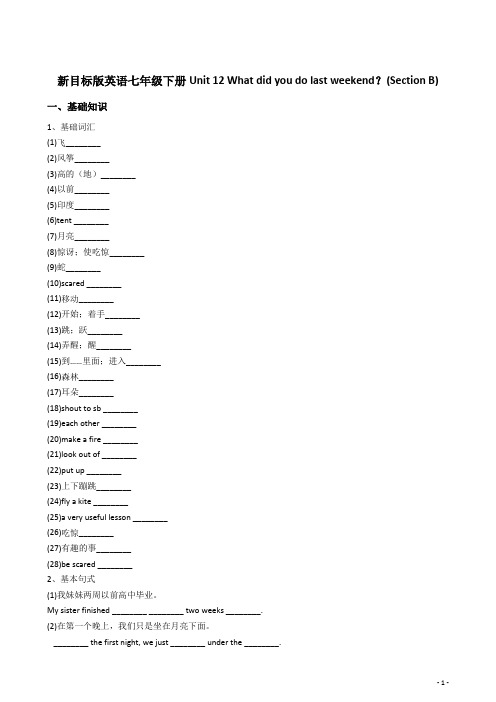
新目标版英语七年级下册Unit 12 What did you do last weekend?(Section B)一、基础知识1、基础词汇(1)飞________(2)风筝________(3)高的(地)________(4)以前________(5)印度________(6)tent ________(7)月亮________(8)惊讶;使吃惊________(9)蛇________(10)scared ________(11)移动________(12)开始;着手________(13)跳;跃________(14)弄醒;醒________(15)到……里面;进入________(16)森林________(17)耳朵________(18)shout to sb ________(19)each other ________(20)make a fire ________(21)look out of ________(22)put up ________(23)上下蹦跳________(24)fly a kite ________(25)a very useful lesson ________(26)吃惊________(27)有趣的事________(28)be scared ________2、基本句式(1)我妹妹两周以前高中毕业。
My sister finished ________ ________ two weeks ________.(2)在第一个晚上,我们只是坐在月亮下面。
________ the first night, we just ________ under the ________.(3)对我来说,这是一个非常有用的教训。
This was a very ________ lesson ________ me.(4)我爸爸开始在他们的帐篷里跳上跳下。
My dad started to ________ ________ ________ ________ ________ their ________.(5)我是如此累,以至于很早就去睡了。
2019-2020年人教版英语七年级下册Unit-12-What did you do last w

( )1.A. summer B. month C. weekday D. weekends( )2.A. a lot B. a lots of C. a lot of D. lot of( )3.A. zoo B. park C. bank D. library( )4.A. tigers B. people C. friends D. animals( )5.A. dangerous B. friendly C. interesting D. ugly( )6.A. houses B. buildings C. cages D. ponds(池塘)( )7.A. angry B. happy C. friendly D. boring( )8.A. looking B. seeing C. watching D. hearing( )9.A. in B. at C. with D. on( )10.A. friendly B. interesting C. warm D. coldⅥ.阅读理解(共15小题,每小题2分,共30分)AJim is an English boy. He comes to China with his father and mother.They comehere to work. Jim comes here to study. He is in No. 15 Middle School. He gets up early every day. He is never late for school. He studies hard.He can read and write English well. He often helps us with our English, and we often help him with his Chinese. After class, he li kes playing football, swimming,running, jumping and riding. He makes many friends here. We’re very glad tostay with him. On Sundays, he often helps his mother clean the house, mendsomething or do the shopping. He likes Chinese food very much.He likes living here. He likes the Chinese students very much. We all like him, too.阅读短文,判断正(T)误(F)。
2023年新版新目标英语七年级下册unit12知识点总结

Unit12 What did you do last weekend?Section A1.camp(1)vi 宿营;露营;扎营go camping 去野营camp out 野营露营(2)n.野营;帐篷;营地summer camp 夏令营winter camp 冬令营2.by(1)by+地点名词表方位,在…旁边by the lake/river/tree/window/door by the side of the path.在路边注:表从…旁通过,多与动词go/walk/pass等连用。
(2)by+时间名词到…时(已发生某事),谓语多用完毕时;最晚、不迟于…,在…之前by now/then/this time/next Friday/the end of/three o`clock等。
By the end of last year,another new gymnasium had been completed到去年年终,又有一座新体育馆峻工了。
(3)by+名词表措施、方式、手段等。
A. by+the+可数旳时间、长度、重量等名词。
按…计算,按…买(卖)by the pound/ton/yard/meter/dozen/bale/day/month等。
B. by+表达时间、长度、重量等总称旳不可数名词(名词前不加冠词)。
按…计算,按…买(卖)by time/volume/length/weight/height/depth/width/area等。
C. by+交通工具、交通方式名词(名词前不加冠词,不变复数)。
通过…,由…,乘…by train/rail/tube/taxi/bus/truck/bike/boat/plane;by land/road/sea/water/air等。
(on foot)D. by+抽象名词或具有抽象意义旳一般名词(名词前不加冠词,不变复数)靠…,通过…,由…所致by skill/determination/practice/diligence/inference/chance/accident;by mail/letter/radio/fax/telephone/telegraph/hand/machine等。
人教版七年级英语(下)Unit12《Whatdidyoudolastweekend》微课精讲
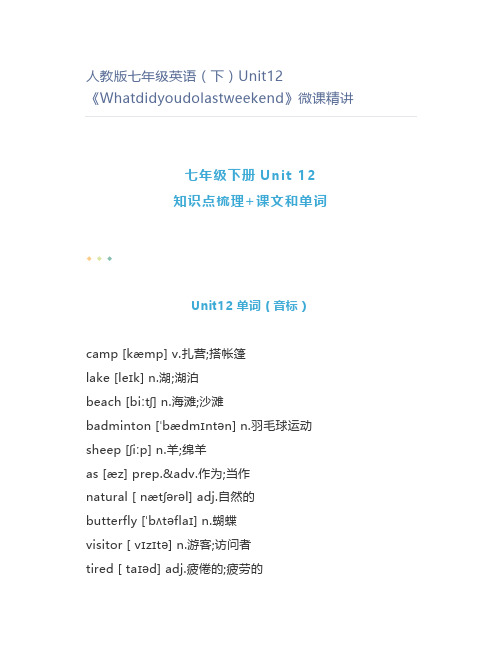
人教版七年级英语(下)Unit12《Whatdidyoudolastweekend》微课精讲七年级下册Unit 12知识点梳理+课文和单词◆◆◆Unit12 单词(音标)camp [kæmp] v.扎营;搭帐篷lake [leɪk] n.湖;湖泊beach [biːtʃ] n.海滩;沙滩badminton [ˈbædmɪntən] n.羽毛球运动sheep [ʃiːp] n.羊;绵羊as [æz] prep.&adv.作为;当作natural [ nætʃərəl] adj.自然的butterfly [ˈbʌtəflaɪ] n.蝴蝶visitor [ vɪzɪtə] n.游客;访问者tired [ taɪəd] adj.疲倦的;疲劳的stay [steɪ] v.停留;待stay up late 深夜不留睡;熬夜away [ə weɪ] adv.离开;远离run away [ rʌnəˌweɪ] 跑开mouse (pl. mice) 老鼠;耗子baby [ beɪbi] adj.&n.幼小的;婴儿shout [ʃaʊt] v.呼叫;喊叫shout a t… 冲……大声叫嚷woof int.(狗叫声)汪汪language [ læŋgwɪdʒ] n.语言fly (flew) v.飞kite [kaɪt] n.风筝fiy a kite 放风筝high [haɪ] adj.&adv.高的(地)high school 中学ago [ə gəʊ] adv.以前India [ ɪndɪə] n.印度tent [tent] n.帐篷put up [ pʊtʌp] 搭起;举起moon [muːn] n.月亮surprise [sə praɪz] n.&v.惊奇;惊讶;使吃惊get a surprise 吃惊snake [sneɪk] n.蛇scared [ /skeəd] adj.惊慌的;吓坏了的move [muːv] v.移动shout to… 对……大声喊叫start [stɑːt] v.开始;着手jump [dʒʌmp] v.跳;跃up and down 上上下下;起伏wake (woke) v.弄醒;醒wake…up 把……弄醒into [ ɪntuː] prep.到……里面;进入forest [ˈfɒrɪst] n.森林ear [ɪə] n.耳朵【重点短语】1. last weekend 上周末2. do one’s homework 做作业3. go to the cinema 看电影4. go boating 去划船5. camp by the lake 在湖边露营6. go to the beach 去海滩7. play badminton 打羽毛球8. on Saturday morning 在周六的早上9. study for the English test 为了英语考试学习10. feed some cows 喂一些奶牛11. work as a guide 做为一个导游工作12. Natural History Museum 自然历史博物馆13. butterfly house 蝴蝶馆14. over 200 kinds ofbutterflies 超过200多种蝴蝶15. tell sb about … 告诉某人关于…16. living habits 生活习惯17. be kind of tired 有点儿累19. stay up 熬夜20. play with sb. 和某人玩21. lose things 丢东西22. run away 跑开23. fly a kite 放风筝24.as a special gift 作为一个特殊的礼物25. take sb. to sp. 把某人带到某地26. go camping 去露营27. put up the tents 搭建帐篷28. make a fire 生火29. keep sb. warm 使某人保持温暖30. on the first night 在第一天晚上31.so...that... 如此…以至于…32. go to sleep 去睡觉33. get a surprise 吃惊34. see sb. doing sth. 看见某人正在做某事35. jump up and down 上蹦下跳36. climb onto one’s back 爬到某人背上37. shout at/shout to 大声喊叫38 wake …up 把...弄醒39. move into… 移入,爬进…中40. a useful lesson 有用的一课【重点句型】1.---What did you do last weekend?你上周末做了什么?---Well, on Saturday, I played badminton.噢.周六我打羽毛球了。
新人教 英语 七年级下册Unit12 What did you do last weekend知识点详解

Unit12 What did you do last weekend?知识点详解单元目标总览:【知识点详解】1、camped by the lake在湖边扎营(1)①camp 作动词,意为“扎营,搭帐篷”。
◆We go camping every summer. 我们每年夏天都去野营。
◆We walked all day and camped by a river at night.我们走了一天,晚上在一条河边宿营。
②camp 作名词,意为“露营地,度假营”。
◆Let’s go back to the camp, it’s getting dark. 让我们回营地吧,天黑下来了。
◆We spent two weeks at camp this summer. 我们今年夏天在度假营玩了两周。
(2)by介词, 意为“在……旁边”,表示位置,相当于beside。
◆Our teacher is sitting by the window. 我们老师坐在窗户旁边。
拓展:by作介词的其他常见用法:(1)表示移动方向,意为“经过”。
◆My mother goes by the building every day. 我妈妈每天从这栋楼旁边经过。
(2)表示方式及手段,意为“用,靠,通过”。
◆He makes a living by fishing. 他以捕鱼为生。
(3)与交通工具名词连用时,名词前不用冠词,意为“乘、坐、用”等。
◆I went there by bike. 我骑自行车去那儿的。
6. tired2、What did you do last weekend?上周末你做什么?What+did+主语+谓语动词原形+其他,这一特殊疑问句用来询问某人在过去某个时间或地点做过什么事情,其中did为助动词,没有人称和数的变化,谓语动词为实义动词原形。
◆—What did you do last night?昨晚你做了什么?—I visited my uncle.我看望了我的叔叔。
